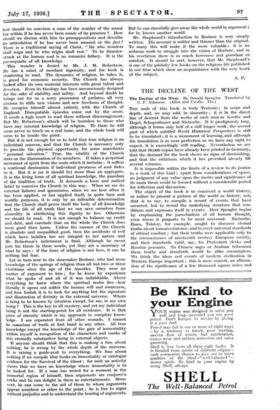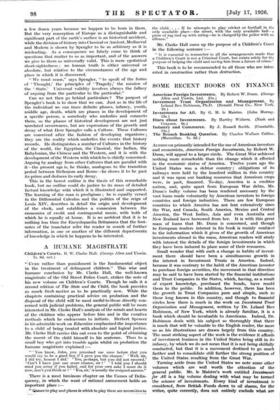THE DECLINE OF THE WEST
ME scale of this book is truly Teutonic ; in scope and depth, and, we may add, in obscurity ; it is in the direct line of descent from the works of such men as Goethe and Hegel, Schopenhauer and Nietzsche. It is prodigiously long, although it forms. only half of a still longer work, the second part of which entitled World Historical Perspectives is still to be translated ; it is a monument of learning, and although the translation is as near perfection as we have any right to expect, it is exceedingly stiff reading. Nevertheless we arc told that 90,000 copies have already been printed in Germany, that the demand for the book shows no signs of diminishing, and that the criticisms which it has provoked already fill several volumes.
It is impossible within the limits of a review to do justice to a work of this kind ; apart from considerations of space, no judgment of any value upon the merits and significance of its main thesis could be formed without a considerable period for reflection and discussion.
The object of the book is to construct a world history, or rather to present a picture of the world as history, not, that is to say, to compile a record of events that have occurred, but to reveal the underlying structure that con- ditions and expresses itself in events. Herr Spengler begins by emphasizing the parochialism of all human thought, even where it purports to be most universal, Nietzsche, Ibsen, Tolstoy, for example, sought to discover eternal truths about human existence, and to erect universal standards of ethical conduct ; but their truths were applicable only to the circumstances of nineteenth century European society, and their -standards valid, say, for Protestant clerks and Russian peasants. To Chinese sages or Arabian tribesmen these truths and standards would be alike meaningless. We think the ideas and events of modern civilization in Western Europe important; this is mere conceit, an affirma- tion of the significance of a few thousand square miles and
a few dozen years because we happen to be born in them. But the very conception of Europe as a distinguishable and significant part of the earth's surface is an historical accident, while the division of history into Classical or Ancient, Mediaeval and Modern is shown by Spengler to be as arbitrary as it is misleading. As a consequence we falsely come to think of questions that matter to us as important, and of the answers we give to them as universally valid. This is mere egotistical short-sightedness ; no human truth is either universal or absolute, but relative to the circumstances of the age and place in which it is discovered.
We must cease," says Spengler, " to speak of the forms of ' Thought,' the principles of ' Tragedy,' the mission of the ' State.' Universal validity involves always the fallacy of arguing from the particular to the particular."
Can we not then go behind particulars ? The purport of Spengler's book is to show that we can. Just as in the life of the individual we can trace definite phases, infancy, youth, middle age, death, which are phases in the development of a specific person, a somebody who underlies and connects them, so the phases of historical development are not just unrelated occurrences, but are expressions of the growth and decay of what Herr Spengler calls a Culture. These Cultures are conceived after the fashion of developing organisms ; they are the reality which underlies the events that history records. He distinguishes a number of Cultures in the history of the world, the Egyptian, the Classical, the Indian, the Babylonian, the Chinese and the Western, and it is with the development of the Western with which he is chiefly concerned. Arguing by analogy from other Cultures that are parallel with it—the present age is, he thinks, analogous to the transition period between Hellenism and Rome—he shows it to be past its prime and deduces its early decay.
This in the barest outline is the thesis of this remarkable book, but no outline could do justice to its mass of detailed factual knowledge with which it is illustrated and supported. The learning of the man is prodigious ; he is equally versed in the Differential Calculus and the politics of the reign of Louis XIV, describes in detail the origin and development of the clock, and establishes a connexion between the economics of credit and contrapuntal music, with both of which he is equally at home. It is no accident that it is to nothing less than the Encyclopaedia Britannica that the foot- notes of the translator refer the reader in search of further information, in one or another of the different departments of knowledge in which he happens to be interested.











































 Previous page
Previous page